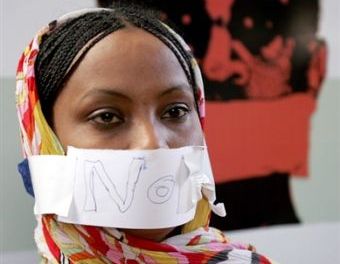Sudan’s parliament witnesses heated discussions over press censorship
October 17, 2011 (KHARTOUM) – A seminar organised by the Sudanese parliament on Monday to discuss proposed amendments to the country’s press law was rattled by an intensive debate about the practice of pre-publication censorship.
 Sudan passed its current Press and Publication Act in April 2009 amid a storm of criticism by journalists who say the law only allows a semblance of freedom and imposes hefty financial penalties on individual journalists and newspapers.
Sudan passed its current Press and Publication Act in April 2009 amid a storm of criticism by journalists who say the law only allows a semblance of freedom and imposes hefty financial penalties on individual journalists and newspapers.
The country’s security authorities routinely censor and confiscate newspapers to prevent publication of information deemed sensitive despite the fact that the country’s constitution guarantees freedom of expression.
In a surprise statement during the seminar, the leading member of the ruling National Congress Party (NCP), Fathi Shilah, described press censorship as an act of backwardness regardless of the authority that implements it.
Press censorship in Sudan is carried out by the country’s National Intelligence and Security Services (NISS). Although censorship has been officially lifted, NISS still contacts newspapers by phone prior to printing and conveys a list of issues that should not be covered.
Fathi Shilah said that censorship was rendered futile by the emergence of new media outlets and the internet. “The current developments say ‘bye bye’ to censorship,” he said, suggesting that discussions over the press law should be opened.
The NCP figure went on to say that his party supports increasing freedoms but he warned that some media houses abuse freedoms.
Mahi Al-Din Titawi, the head of the Sudanese Journalists Union (SJN), which is dominated by pro-government individuals, said during the seminar that the SJN would not allow the passing of a new law that curtails freedom and gags mouths.
He added that the current law must be amended to accommodate “the forthcoming era of freedom and democratic transformation,” in Sudan.
Meanwhile, the SJN’s deputy chairman opined that the real problem lies in the National Security Act which gives NISS the power to confiscate and censor newspapers, saying that there is no use in amending the press law without amending the National Security Act.
For his part, the veteran journalist Mahjoub Erwa and former editor-in-chief of Al-Sudani newspaper launched a severe attack on the “interference” of the authorities in the press, warning that a new press law must guarantee freedom or else the state of political rankling in the country will lead to implosion.
(ST)
